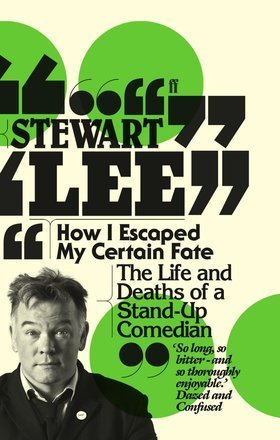What do you think?
Rate this book


394 pages, Paperback
First published January 1, 2010
But then I felt the sick rising in me again, and I thought, ‘What am I supposed to do now?’ […] And then I opened my eyes and I looked down, and He was there again, Jesus, on my right. But this time He had His back to me and He was doing a kind of handstand by the sink. And his raiment had slipped down, it looked like a kind of third-length, floral print hospital gown. And He had His right hand on the floor to, to balance Him upside-down, and with His left hand He was using the fingers to kind of splay open His anus. As if what He…As if what He wanted was for me to vomit into the gaping anus of Christ.
[off-mic, shouting] And don't imagine, Cardiff, that I come here and talk about this lightly, OK? I thought about it, I asked around – well, I know it's a bit much but I asked around, I said to – oh look, I asked Tony Law, he's a Canadian stand-up comic, he's the most reasonable man I know, I said to him, ‘Tony, do you honestly think I can go round the country in front of people and use the phrase, “I vomited into the gaping anus of Christ”?’ And he said, ‘Well, possibly, if it's in context. But,’ he said, ‘you won't be able to use it as the title of a live DVD.’ I said, ‘I'm not going to do that, Tony, I'm not insane.’
But imagine this situation, it is impossible. There is no right way out of it. I bent down, I said to Jesus, ‘Are you sure this is what you want?’ And He said to me, ‘Look, you're going to be taken to court for blasphemy for doing nothing, I feel like I owe you one, knock yourself out.’ So against my better judgement, 'cause He told me to, I did it. I vomited into the gaping anus of Christ till the gaping anus of Christ was overflowing with my sick. I did that. Are you happy now?
Was it possible to write something which, when reduced to its content alone, would be impossibly offensive, featuring as it did a urine-and-vomit-fuelled encounter between a drunk comedian and a holy figure in a cramped toilet, and yet to write and perform it in such a way that it became tender, moving and meaningful over and above the supposed taboo nature of its content alone? […] In short, if you felt our careful, theologically rigorous and kind-hearted opera was blasphemous, well, try this on for size, you twats, and – you know what? – I will still win on points. I will make meaningful religious art out of toilet filth, just to beat you.
The chiselling here, where I tapped the mic stand with the mic, went on at some length, sometimes uninterrupted for minutes at a time, with me varying the rhythm and intensity of the tapping. This doesn't work on the page, and ideally, my ambition is to get to a point where none of my stand-up works on the page. I don't think stand-up should work on the page, so the very existence of this book is an indication of my ultimate failure as a comedian. The text of a stand-up set should be so dependent on performance and tone that it can't really work on the page, otherwise it's just funny writing. You don't have to have spent too long thinking about stand-up to realise that even though critics and TV commissioners always talk about our art form in terms of its content, it is the rhythm, pitch, tone and pace of what we do — the non-verbal cues — that are arguably more important, if less easy to identify and define.
If you've not seen me before, right, a lot of what I do, er, it's not jokes as such, it can just be funny kind of ideas or little, er, weird turns of phrase like that, yeah? So, 'owner-operator of an enchanted beanstalk', yeah? And that's a giant, isn't it, a giant... So all I’m saying, if you’ve not seen me before, yeah, is the jokes are there, they're there, but some of you, you might have to raise your game.
Basically there’s a whole generation of people who’ve confused political correctness with health and safety regulation. ‘It’s gone mad. They saying I can’t have an electric fire in the bath any more, Stew, in case queers see it.’